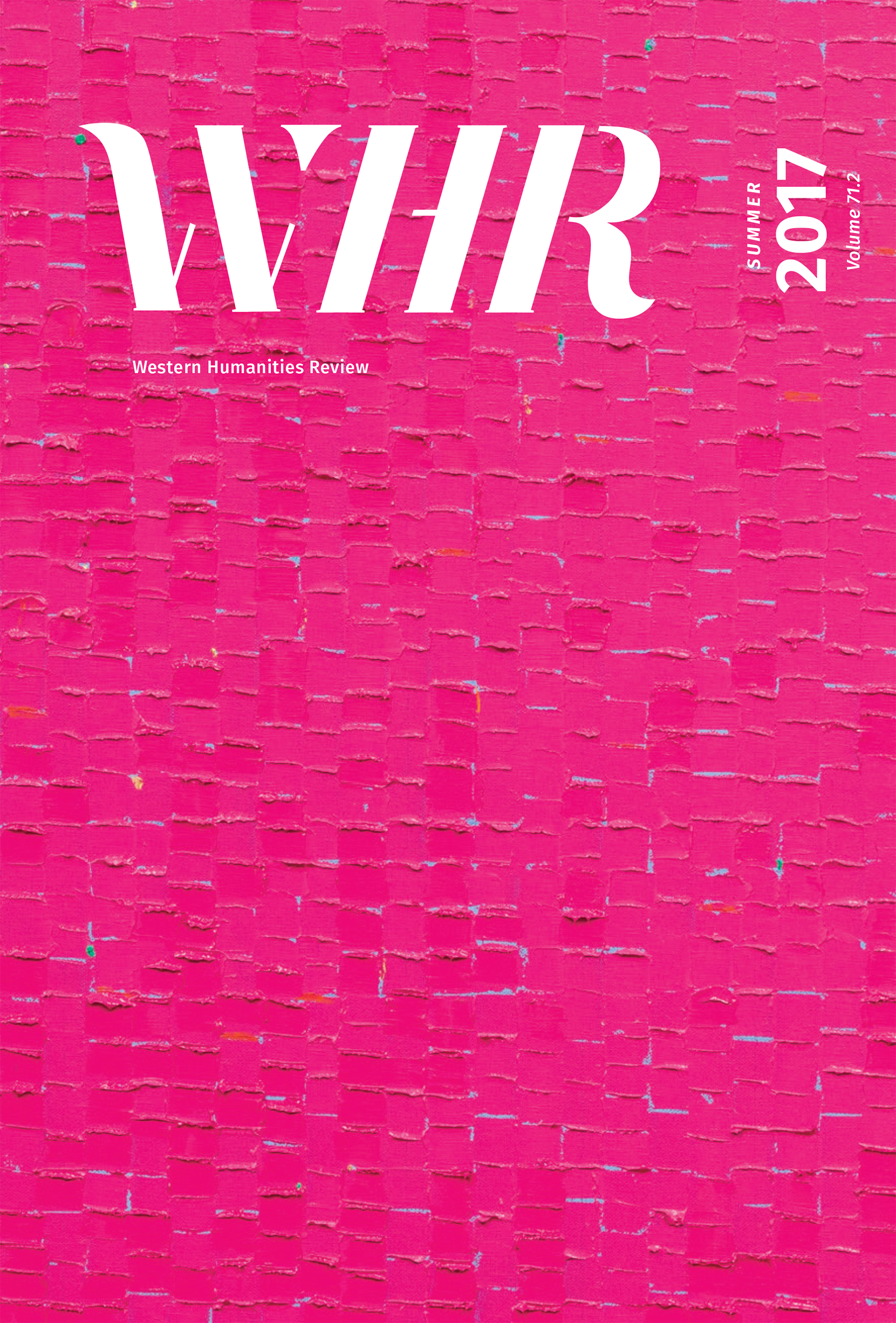Editor & Fiction Editor – Michael Mejia
Poetry Editors – Katharine Coles, Craig Dworkin, Thomas Stillinger
Nonfiction Editors – Stuart Culver, Jeremy Rosen
Managing Editor – Emily Dyer Barker
Consulting Editors – Barry Weller, Mindy Wilson
Print Design – Hailey Rabdau
Web Design – Adam Halstrom
Reviews Editors – Tyler Goldman, Michelle Macfarlane
Editorial Assistants – Maria Alberto, Jacqueline Balderrama, Eric Blix, Jace Brittain, Kelly Craig, Tyler Goldman, Ceridwen Hall, Paul Mendoza, Yvette Mylett, Joe Sacksteder, Madeline Thatcher, Becky Thomas, Rachel Zavecz
Editorial Board – Scott Black, Vincent Cheng, Norman Council, Karen Lawrence, Michael Martone, Stephen Tatum
Cover Image – Young-Il Ahn, Water BLBP-17, 2017, oil paint on canvas, 52 x 48 inches; photo by Michael Underwood Photography, courtesy of the artist © Young-Il Ahn.
Editor’s Note
This issue of Western Humanities Review features, among other wonders, four short essays by Brian Evenson—on painting, breaks, ghosts, and monsters—all executed in a consistent manner, or method, in a form of curious and witty inquiry the author labels reports.
It’s a term that got us thinking, report, with respect to the rest of the issue—a term defining an approach to narrative, an attitude toward its subject—perhaps objective, or at least slightly distanced—perhaps completely subjective, evaluative—official maybe—though who’s to say what conveys authority anymore—with a tendency toward speculation rather than conclusion.
That is, a report’s author’s function is to provide something like “an account of a situation, event, etc.,” as William Woolfitt does in his poem “Mountain Sweep,” digging into some of the darkest soil of Appalachian history.
The report is “an evaluative account or summary of the results of an investigation,” or “a notification of something observed.”
“[W]hat held together / by youth alone comes undone,” John Sibley Williams informs us in “How Skin Comes to Resemble a Map.”
“Beyond ambulance windows,” notes Cindy King, “Dusk joins the sky’s dark pieces / Inspiring all things to come together.”
“My patience is a ragged scrap of flannel,” Sara Greenslit writes, reminding us that the report’s inherent admixture of objective purpose and subjective process—subjugating pre-linguistic perception, and perhaps comprehension, to translations into articulate idea and then writing—makes the genre particularly ripe for metaphor, for interpretation of what has not yet had any other words, for the reporter’s aesthetic intrusion, that is, for a sweet fashioning of fact, or something like it.
The report’s author records what he or she or they have witnessed, experienced, perceived, come to believe.
Which is to say, as Evenson’s titles suggest, as does Amy Pence’s “UFO”—aliens: yes? no?—we shouldn’t assume that a report’s subject is necessarily real. That is, report may also denote a rumor or gossip or a common, if baseless, belief.
“Are you seeing this?” Pence’s recollected, recollecting speaker wants to ask. “Did that really happen?”
It may refer to an accusation, founded or not.
“You are obsessed with how I react,” claims Marream Krollos’s speaker. “You make my hands hurt. You know I need you because it is you doing this to me.”
Of course, we know, too, that observation affects the thing observed, as Evenson and Pence and King and all the others’ subjects jitter and shine in specific and affecting ways throughout the process of their being languaged—languaged in the particular manner of their authors, wrapping them up in personal networks of memory, philosophy, literature, song, or play.
And our definitions above include, or assume, also, an auditor, the interlocutor, the reader, the report having been “brought by one person to another,” that recipient honored by it, in a sense, that initial one, the reporter, acting as a kind of “emissary,” which links our term, intellectually and etymologically, socially, to another, from the French: rapport.
“Monsieur Buys and Van Derdussen have made their rapport,” the Duke of Marlborough penned in 1710—
Yes, but let’s push on to rapport’s “harmonious accord,” to “a close relationship or connection,” to a “mutual understanding between persons; sympathy, empathy, connection”—
“I consider the people seated next to me,” Bret Shepard observes from his middle seat. “I consider / whether or not they are my family for a few hours.”
“Así era tu piel”: Idea Vilariño. “Your skin was like this.”
“Years now you have lived / beside the mountain,” Caylin Capra-Thomas proposes in the first line of a poem whose title, “Marriage,” more than adequately guides us into the mystery of her portrait—her report not just on the thing, but on the state of things.
Let’s push on to “a state in which mesmeric action can be exercised by one person on another”—push on to the visions of Korean-born artist Young-Il Ahn, his images—on our cover, in our gallery, our pages—his impressions, his observations of water, of the ocean, textured and voluminous, placid—maybe pacific?—in their carefully gridded containment—and yet implying motion with their contrasting dots of color—light? A rigorously executed glimpse, then, of change—water’s intransigence—between moments, turned by a sharp eye and interpreting hand, into a yawning—yawing?—permanence—awesome, awful—mesmeric, indeed.
A report such as this: a repetitive, musical sound.
“A resounding noise, esp. that caused by the discharge of a firearm or explosive.”
We report.
As writers, artists, makers, we are inclined, perhaps bound, to report the world as we receive it, as it acts on us, as you act on us—rewording, retooling our terms, our means and materials in order to provide some kind of accuracy—our duty—our kind of accuracy—idiosyncratic and strange, musical, considered, reconsidered, ecstatic and elusive, finding harmony in our rapport, something humming in a complimentary phase, in you.
We are deeply grateful to special editor Jesse Lee Kercheval, and to her authors and translators, for organizing a resonant tribute to eight remarkable Uruguayan women poets.
And now, come in, eyes and ears open to the testimonies.
Talk back. Sing. Act.
Summer 2017 | Volume 71.2
Andrew S. Nicholson
Two Poems
Cindy King
Three Poems
Marream Krollos
Two Stories
Elizabeth Breese
Three Poems
Kara van de Graaf
Two Poems
Sara Greenslit
The Subtler Sense, This is Just Part
Caylin Capra-Thomas
Marriage
Brian Evenson
Four Stories
Bret Shepard
Four Poems
UNBROKEN CHAIN: The Tradition of Uruguayan Women Poets
Idea Vilariño
Four Poems
Translated by Jesse Lee Kercheval
Amanda Berenguer
Three Poems
Translated by Kristin Dykstra
Ida Vitale
Four Poems
Translated by Katherine M. Hedeen and Víctor Rodríguez Núñez
Selva Casal
Three Poems
Translated by Jeannine Pitas
Nancy Bacelo
Three Poems
Translated by Catherine Jagoe
Marosa di Giorgio
Extractos de Clavel y tenebrio
Translated by Jeannine Pitas
Circe Maia
Four Poems
Translated by Jesse Lee Kercheval
Tatiana Oroño
Three Poems
Translated by Jesse Lee Kercheval
Young-Il Ahn
Art Feature: Look to the Sea
Kathleen Winter
Two Poems
Amy Pence
UFO
Virginia Konchan
La Vie
Nico Alvarado
L’Étranger
Kyle Booten
Two Poems
Charlie Clark
Antonyms for Proteus
John Sibley Williams
Two Poems
Kate Nitze
Speech Therapy
William Woolfitt
Mountain Sweep
Dayna Patterson
Two Poems
Lesley Howard
Decomposition
Kenny Williams
Two Poems


